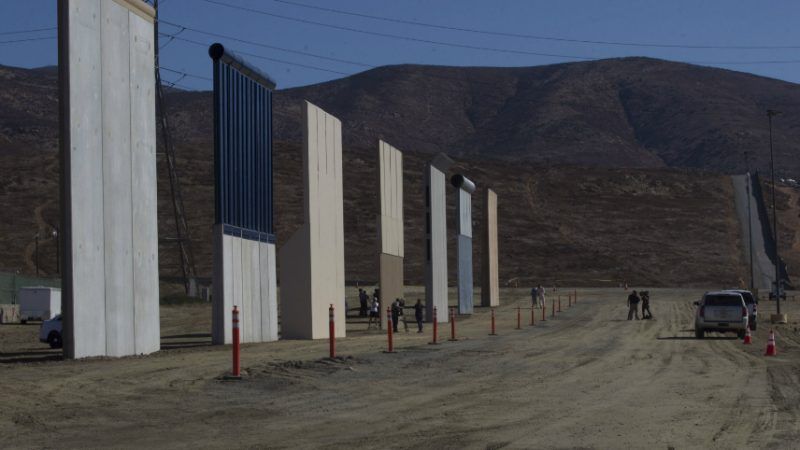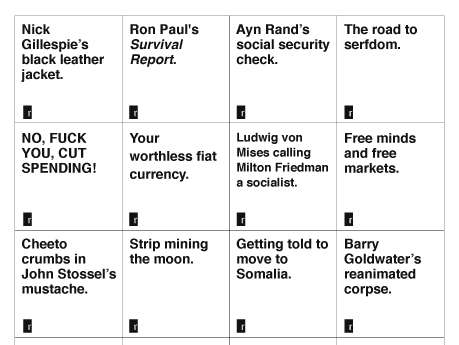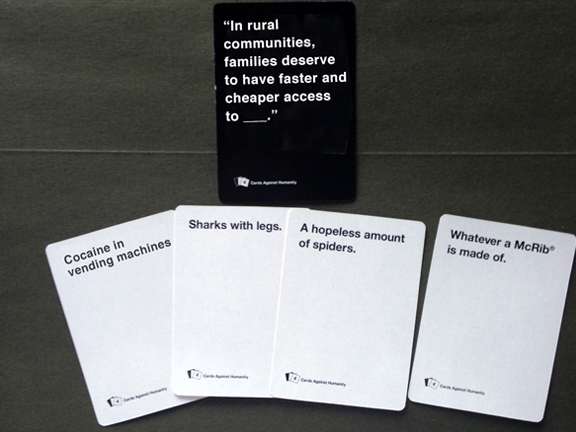Can Cards Against Humanity Stop Trump's Wall?
No, because Trump doesn't care about private property rights.


The company behind the delightfully profane card game Cards Against Humanity wants to stop President Donald Trump's signature promise. On Tuesday, the game maker announced that it had purchased a plot of land on the U.S.-Mexico border and retained a law firm specializing in eminent domain. The aim: to make it "as time-consuming and expensive as possible" to build a border wall.
The move is characteristic for a company known for politically tinged publicity stunts. But it will likely be ineffective, given the administration's willingness to trample private property rights.
Trump's Department of Justice is asking Congress for $1.8 million to hire 20 new staff members—including 12 land acquisition attorneys—for what it describes as a "massive and unprecedented" amount of eminent domain seizures required for the wall.
According to the administration's initial budget ask, these attorneys are needed to cope with the "initial litigation surge" that is expected to come when wall construction gets underway, and to handle any seizure cases involving "political sensitivities."
The request is just one of the feds' recent moves to take private parcels along the border.

In July, Customs and Border Protection (CBP) and with the Army Corps of Engineers began reviewing the property records along the Texas portion of the southern border, as part of its "preparatory activities" for the wall.
Homeland Security Committee staffers have also interviewed Noel Benavides of Roma, Texas. The government initially attempted to seize a 5-acre strip of land on Benavides' border property in 2008, but it eventually lost interest in the case. Its interest returned in February, less than a month after Trump's inauguration, when Benavides received a notification that legal proceedings against his property had started up again. Benavides, whose wife's family initially received the property as part of a Spanish land grant in 1767, says he is not going without a fight, telling committee staffers that "they could offer me a billion dollars and I wouldn't take it."
Cards Against Humanity is promising similar resistance to any attempts to seize their border land. That won't stop Trump from proceeding with his plans for a big, bright Berlin Wall in the desert, but it does mean his administration will have to spend a lot more time and energy getting the job done.
How much more is still an open question. Though it already asked for $1.6 billion to begin the wall's construction, and though it is testing wall prototypes outside San Diego, the Trump administration is still unable to answer how many Americans will have their land seized to build the wall, how much those seizures will cost, or when those seizures will be completed.
All the administration has provided so far is a guesstimate that "potentially hundreds or thousands of parcels of land are needed for the project."
Past fencing projects provide some insight to the difficulties ahead. In order to build 211 miles of fencing, CBP had to acquire over 600 separate parcels of property, 330 of them via eminent domain. Some 90 of those eminent domain cases are still pending; they will cost roughly $21 million to resolve.
Doing the same for 1,000 miles of border wall is a much larger undertaking, even without a trolling card game company promising to fight them tooth and nail.
That doesn't mean it won't happen, as Trump has both the power and willingness to get the job done. But it does mean that the border wall, in addition to being an ineffective border security solution, is totally incompatible with the rights of hundreds of property owners.
Note: Those depressed by the news always have the option of cheering themselves up with the Reason's libertarian-themed Cards Against Humanity expansion.
Rent Free is a weekly newsletter from Christian Britschgi on urbanism and the fight for less regulation, more housing, more property rights, and more freedom in America's cities.


Show Comments (63)